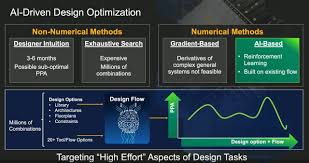In recent years, artificial intelligence (AI) has dramatically transformed various sectors, and mechanical engineering is no exception. AI’s integration into mechanical engineering has paved the way for innovative solutions, enhancing design, manufacturing, maintenance, and overall system efficiency. This article delves into the profound impact of AI on mechanical engineering innovations, exploring how AI is reshaping the field and driving advancements.
1. AI-Driven Design Optimization

AI technologies are revolutionizing the design process in mechanical engineering. Traditional design methods often involve extensive trial and error, but AI enables more efficient and precise optimization.
Key Innovations:
- Generative Design: AI algorithms can generate multiple design options based on specified parameters, allowing engineers to explore a wider range of possibilities. This process optimizes for performance, material usage, and cost-effectiveness.
- Topology Optimization: AI can analyze complex structures and suggest modifications that enhance strength and reduce material usage without compromising performance.
Impact:
- Enhanced Efficiency: AI-driven design tools significantly reduce the time required to develop optimized designs.
- Cost Savings: Improved material utilization and reduced prototyping costs lead to financial savings.
2. Predictive Maintenance and Reliability
Predictive maintenance is one of the most impactful applications of AI in mechanical engineering. By analyzing data from sensors and machinery, AI can predict potential failures and schedule maintenance before issues arise.
Key Innovations:
- Condition Monitoring: AI algorithms analyze real-time data from equipment sensors to detect anomalies and predict wear and tear.
- Failure Prediction: Machine learning models can predict equipment failures with high accuracy, allowing for timely maintenance interventions.
Impact:
- Reduced Downtime: Proactive maintenance minimizes unexpected breakdowns, leading to increased operational efficiency.
- Cost Efficiency: Early detection of issues helps prevent costly repairs and replacements.
3. Enhanced Manufacturing Processes
AI is transforming manufacturing processes by introducing automation and improving quality control. AI-powered systems streamline production, enhance precision, and optimize workflows.
Key Innovations:
- Robotic Automation: AI-driven robots can perform complex tasks with high precision and adaptability, such as welding, assembly, and quality inspection.
- Quality Control: Machine vision systems powered by AI can detect defects and inconsistencies during production, ensuring high-quality output.
Impact:
- Increased Productivity: Automation reduces manual labor and accelerates production rates.
- Improved Quality: Enhanced quality control leads to fewer defects and higher product standards.
4. Smart Manufacturing and Industry 4.0
The concept of Industry 4.0 integrates AI and IoT (Internet of Things) to create smart manufacturing environments. This approach enhances connectivity, data analysis, and decision-making.
Key Innovations:
- IoT Integration: AI processes data from interconnected devices and systems, providing real-time insights and facilitating informed decision-making.
- Adaptive Manufacturing: AI algorithms adjust production parameters dynamically based on real-time data, optimizing processes and resource allocation.
Impact:
- Operational Efficiency: Real-time data and adaptive processes lead to more efficient manufacturing operations.
- Enhanced Flexibility: Smart manufacturing systems can quickly adapt to changing demands and production requirements.
5. AI in Robotics and Automation

AI’s role in robotics and automation extends beyond manufacturing. Robots equipped with AI capabilities are becoming increasingly advanced, offering new possibilities in various applications.
Key Innovations:
- Autonomous Robots: AI enables robots to navigate and perform tasks autonomously in complex environments, such as warehouses and construction sites.
- Collaborative Robots (Cobots): AI-powered cobots work alongside humans, assisting with tasks and enhancing productivity in collaborative settings.
Impact:
- Enhanced Capabilities: AI-driven robots can perform tasks with greater precision and autonomy.
- Improved Safety: Cobots enhance workplace safety by performing dangerous or repetitive tasks.
6. AI-Enhanced Simulation and Testing
AI is transforming the way simulations and testing are conducted in mechanical engineering. Advanced simulations provide more accurate predictions and insights into system behavior.
Key Innovations:
- Real-Time Simulations: AI algorithms facilitate real-time simulations, allowing engineers to test and refine designs quickly.
- Predictive Testing: AI models predict performance outcomes based on various conditions, reducing the need for physical prototypes.
Impact:
- Accelerated Development: Faster simulations and testing processes speed up the design and development phases.
- Cost Reduction: Reduced reliance on physical prototypes lowers development costs.
7. AI in Material Science and Development
AI is making significant strides in material science, enabling the development of new materials with tailored properties for specific applications.
Key Innovations:
- Material Discovery: AI algorithms analyze vast datasets to identify and develop new materials with desired characteristics.
- Material Optimization: AI enhances the properties of existing materials by optimizing composition and processing conditions.
Impact:
- Advanced Materials: Development of materials with enhanced performance and functionality.
- Innovation Acceleration: Faster discovery and optimization of materials support technological advancements.
8. AI-Driven Energy Efficiency Solutions
Energy efficiency is a critical focus in mechanical engineering, and AI is playing a key role in optimizing energy usage and reducing waste.
Key Innovations:
- Energy Management Systems: AI algorithms analyze energy consumption patterns and optimize usage to reduce costs and environmental impact.
- Smart Grids: AI enhances the efficiency and reliability of smart grids by managing energy distribution and predicting demand.
Impact:
- Reduced Energy Costs: Optimized energy management leads to lower operational costs.
- Environmental Benefits: Improved energy efficiency contributes to sustainability goals.
9. AI in Aerospace Engineering
AI is transforming aerospace engineering by improving design, manufacturing, and operational efficiency in aircraft and spacecraft.
Key Innovations:
- Autonomous Flight Systems: AI enables autonomous control and navigation of aircraft, enhancing safety and efficiency.
- Predictive Maintenance for Aerospace: AI predicts maintenance needs for aircraft, improving reliability and safety.
Impact:
- Enhanced Safety: Autonomous systems and predictive maintenance increase operational safety.
- Operational Efficiency: AI improves performance and reduces operational costs.
10. Ethical Considerations and Future Directions

As AI continues to shape mechanical engineering, addressing ethical considerations and potential challenges is essential.
Key Considerations:
- Data Privacy: Ensuring the protection of sensitive data used in AI applications.
- Bias and Fairness: Addressing biases in AI algorithms to ensure fair and equitable outcomes.
Future Directions:
- Integration with Emerging Technologies: AI will continue to integrate with technologies such as quantum computing and advanced materials.
- Focus on Sustainability: Future AI innovations will emphasize sustainable practices and environmental impact.
Conclusion
The impact of AI on mechanical engineering is profound and far-reaching, driving innovations across design, manufacturing, maintenance, and more. As AI technologies evolve, they will continue to enhance the capabilities and efficiency of mechanical engineering, leading to groundbreaking advancements and improved solutions. Staying informed about these developments is crucial for engineers, businesses, and technology enthusiasts looking to harness the full potential of AI in mechanical engineering



